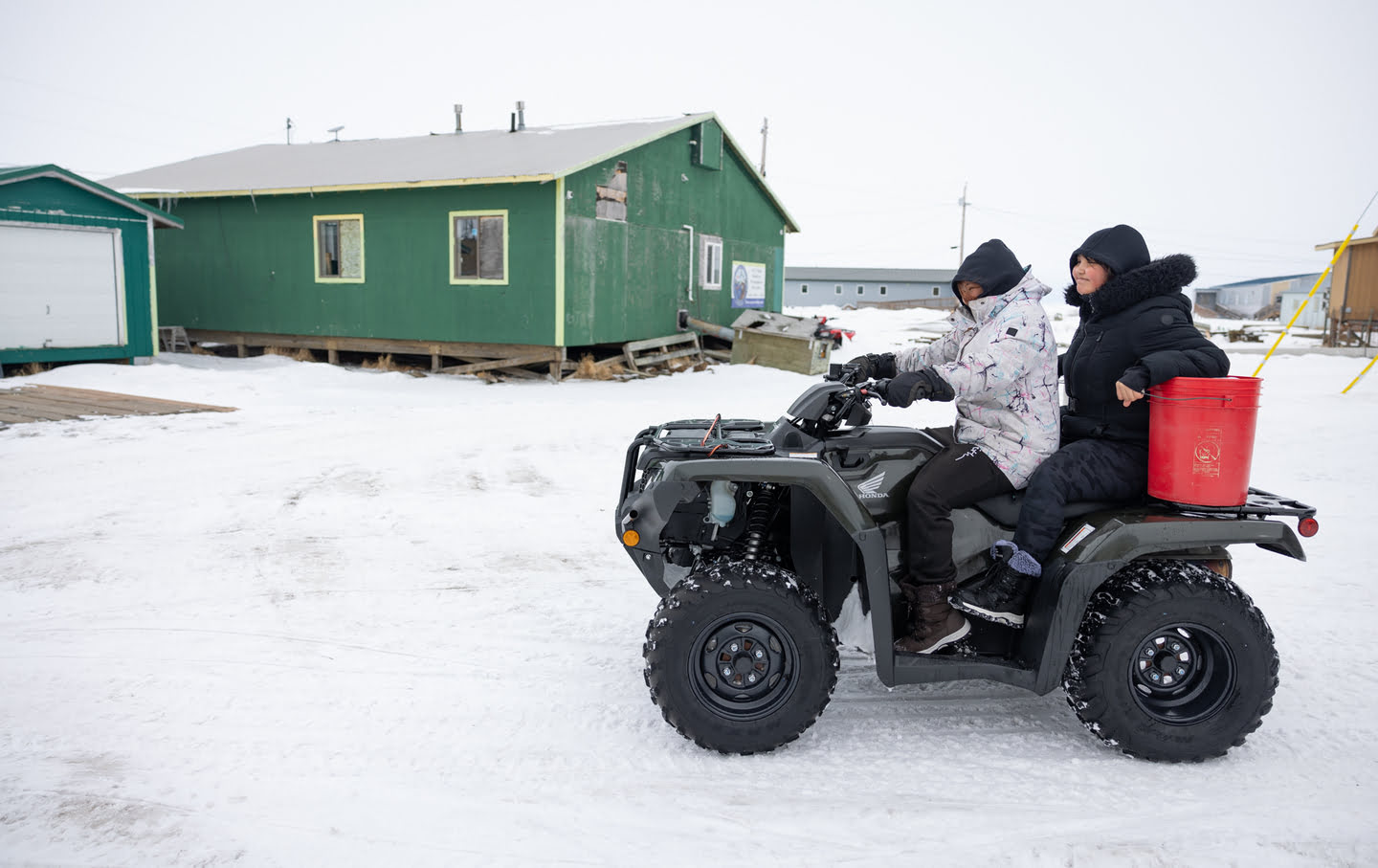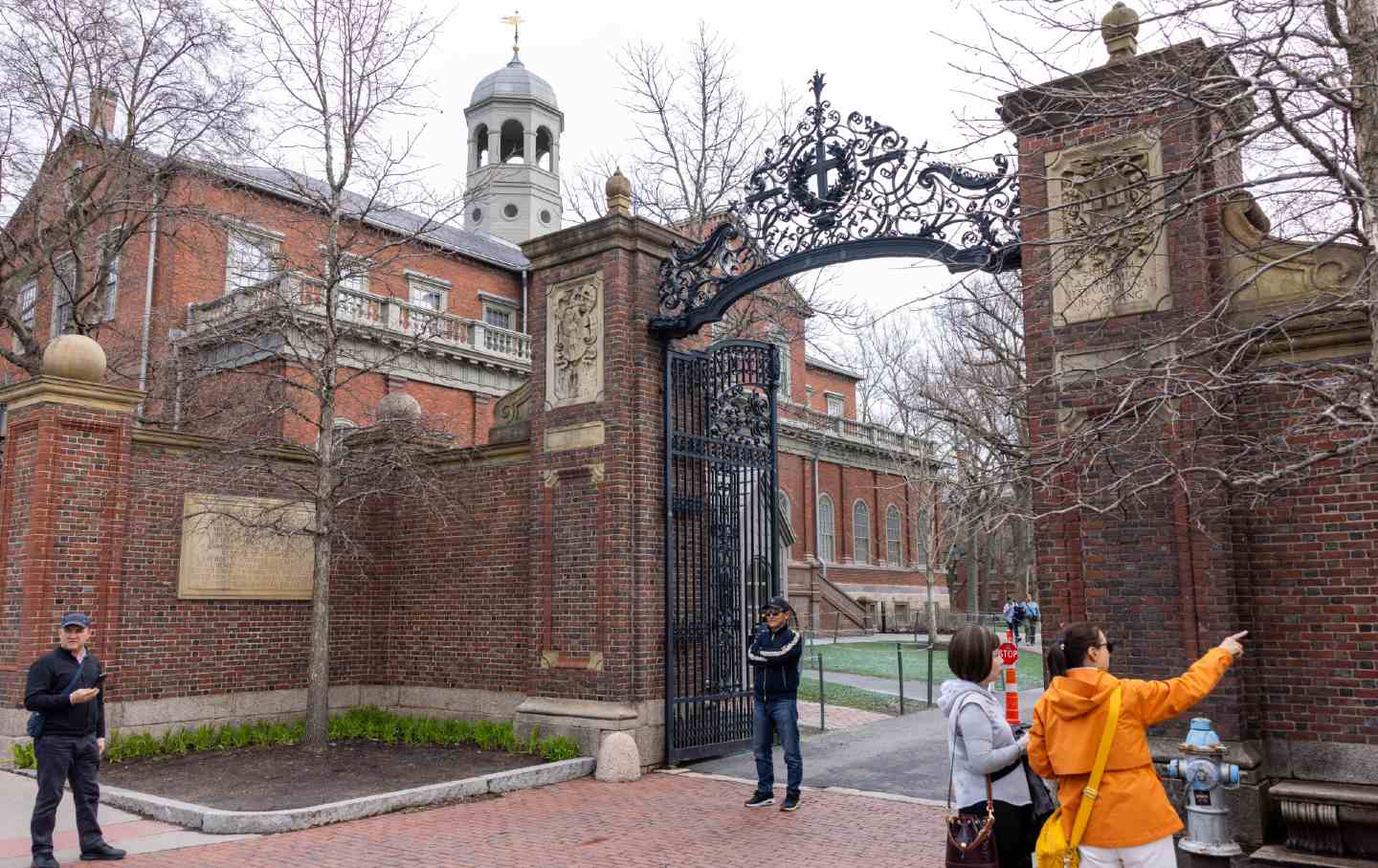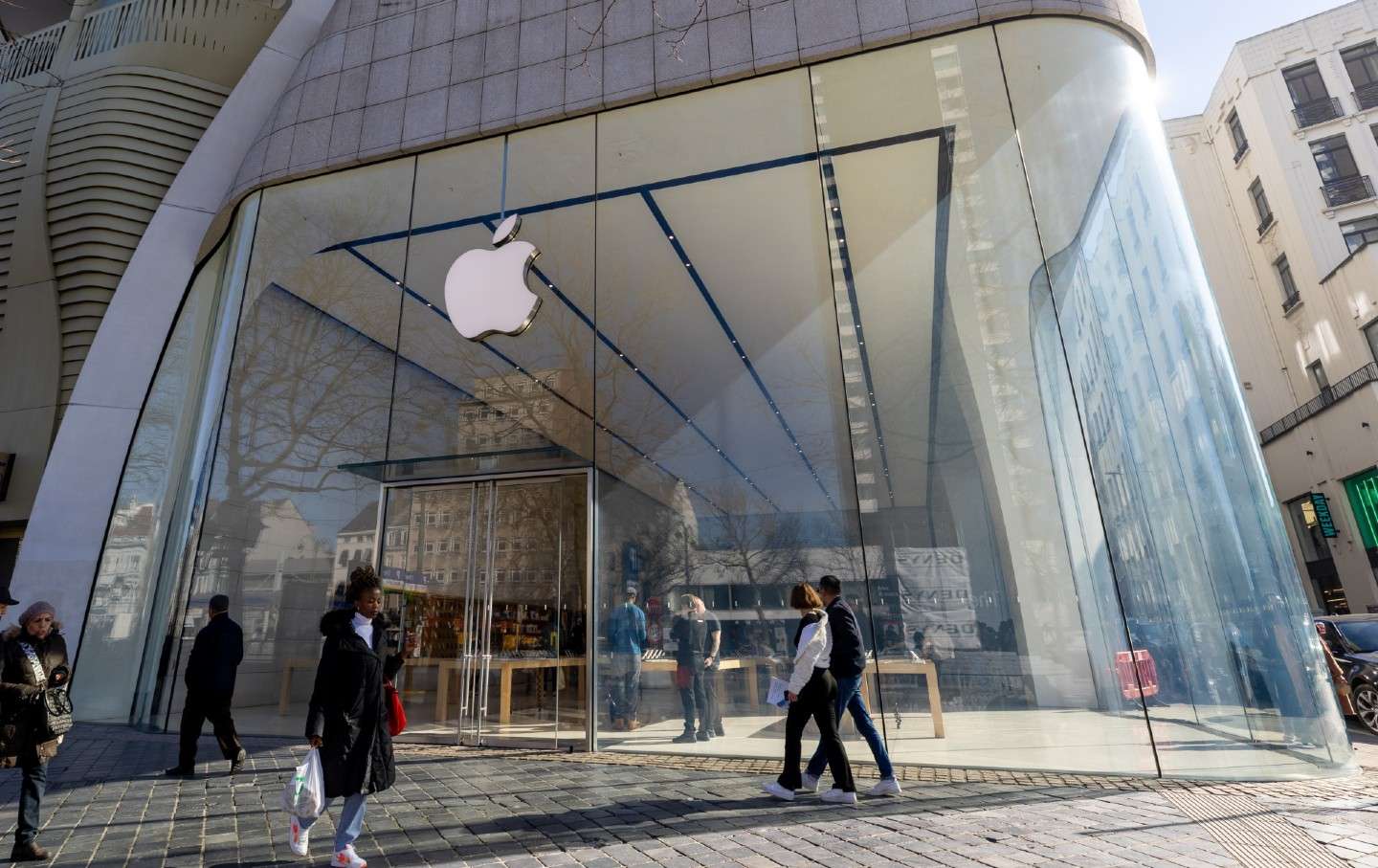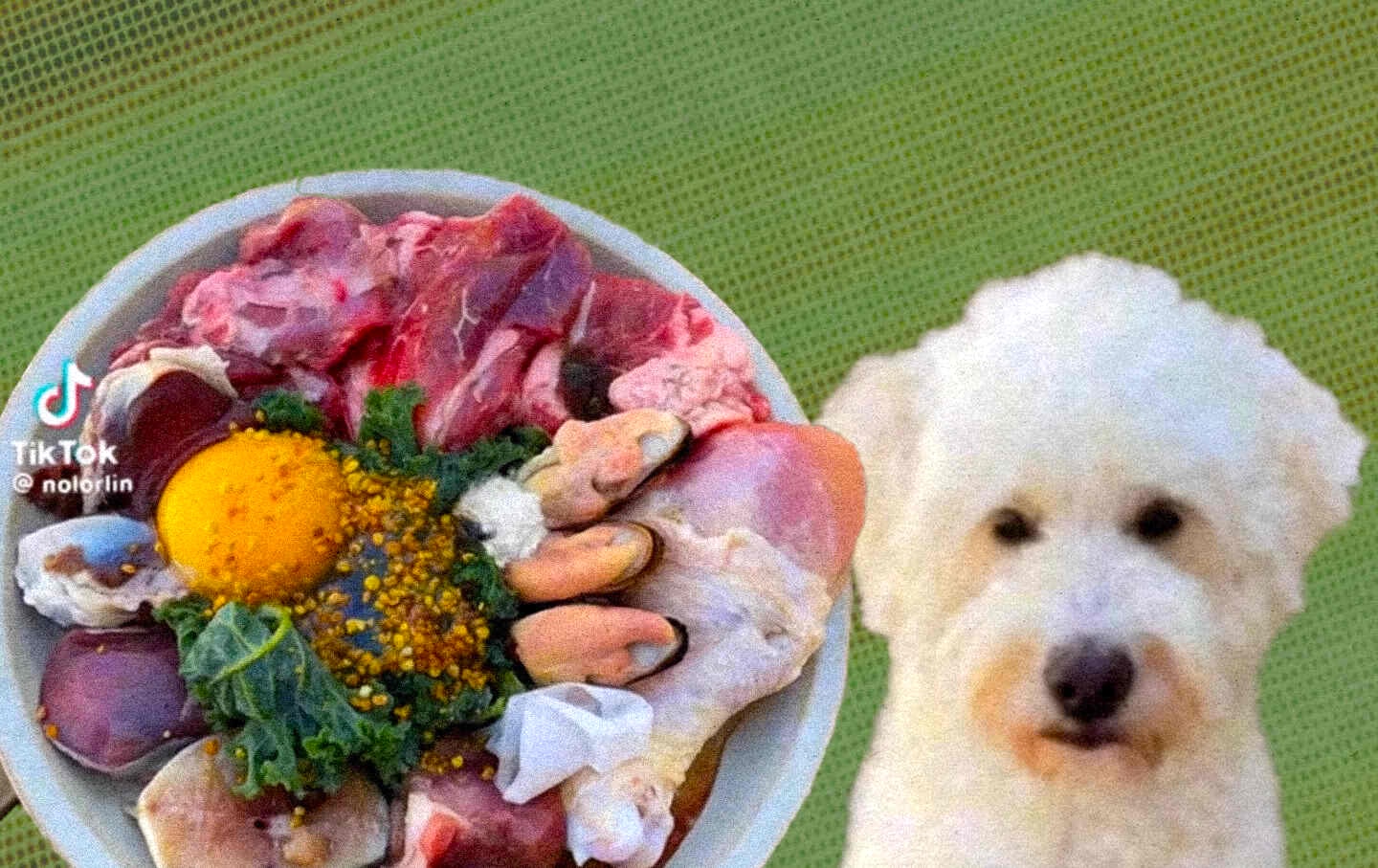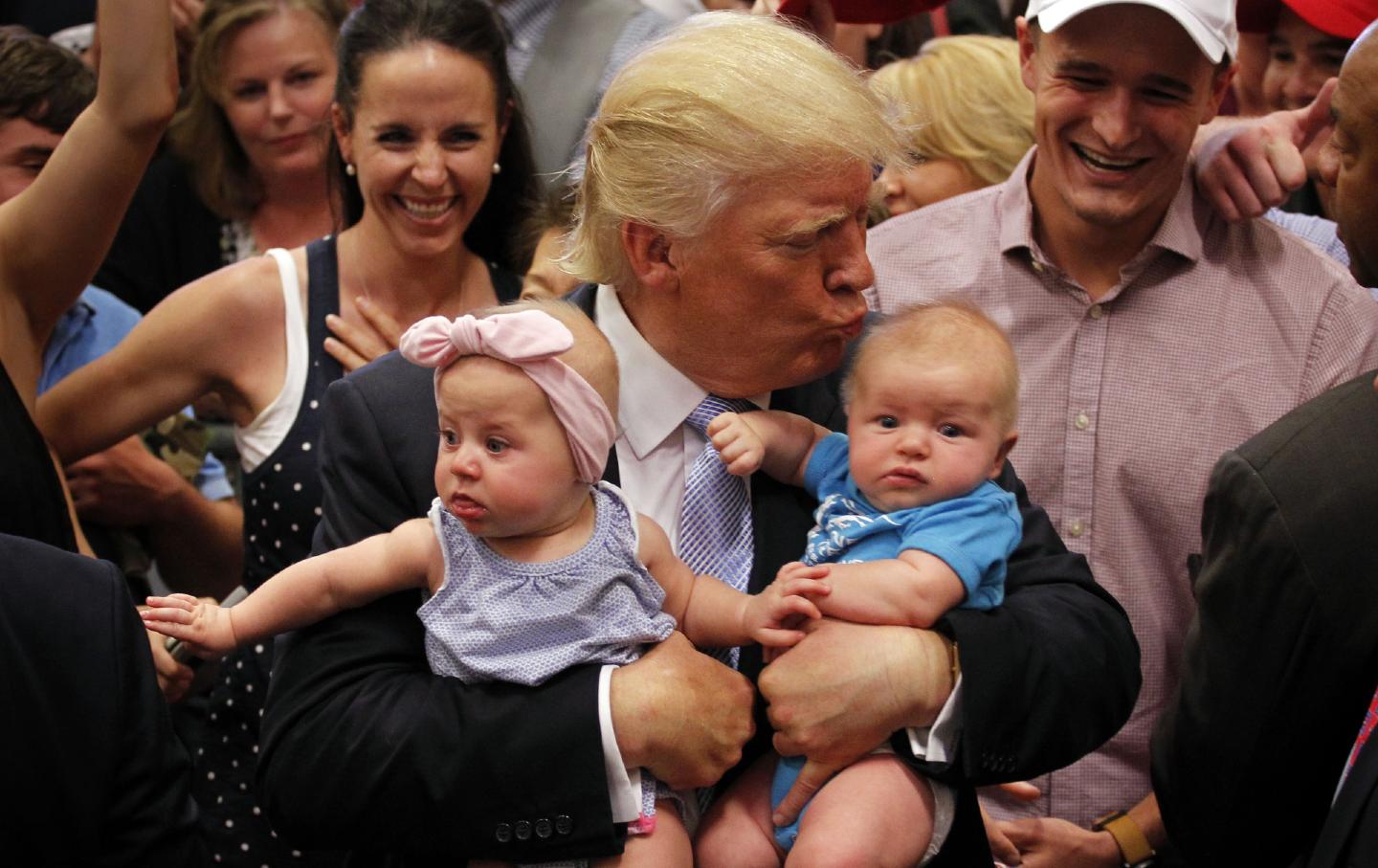A New Jewishness Is Being Born Before Our Eyes
The future of our people is being written on campuses and in the streets. Thousands of Jews of all ages are creating something better than what we inherited.
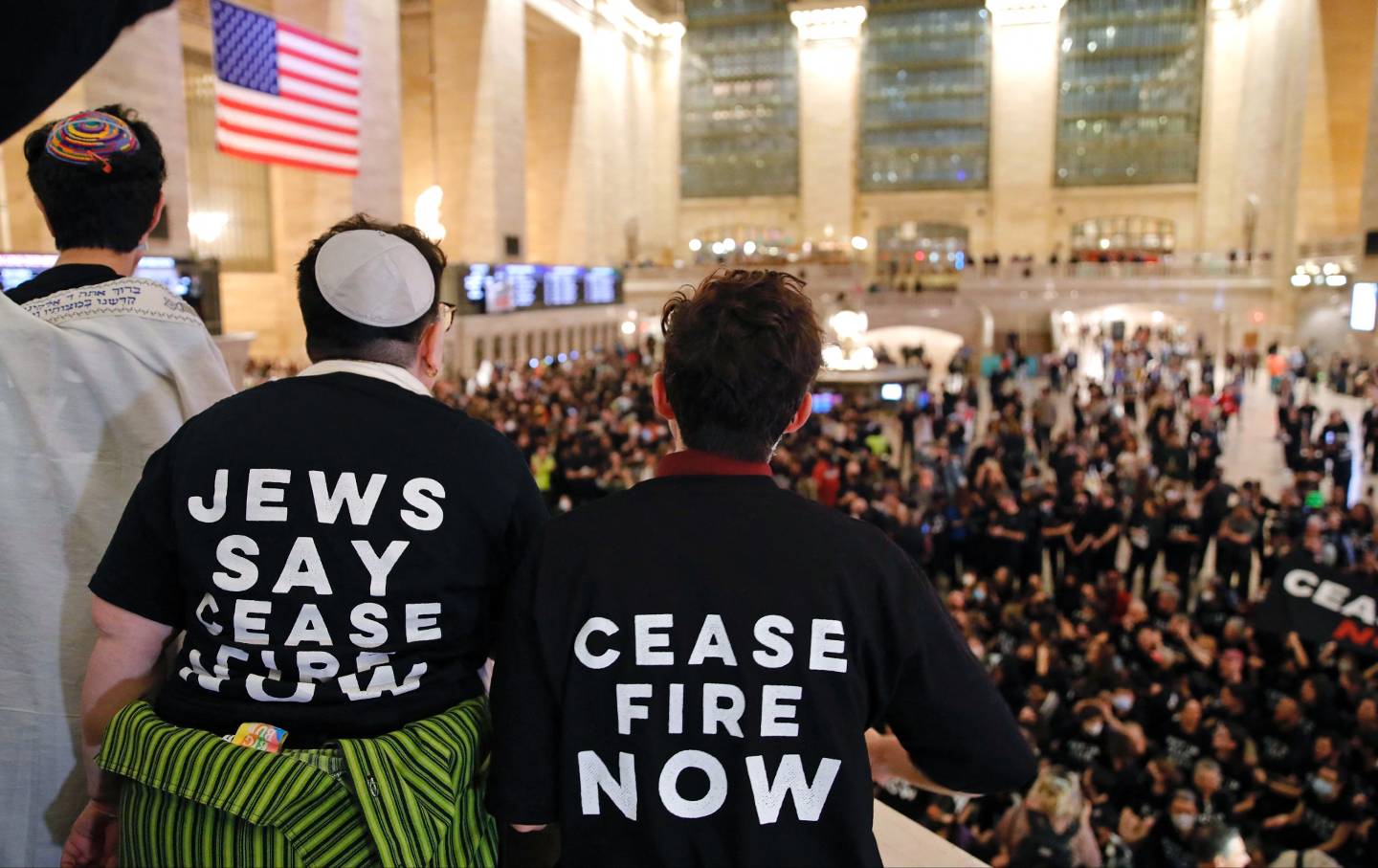
Jews calling for a cease-fire in Gaza demonstrate at Grand Central Station in New York City on October 27, 2023.
(Kena Betancur / AFP via Getty Images)
Last Friday evening, amid the national panic over the campus protests in solidarity with Gaza, I met fellow Jews in downtown Los Angeles to welcome Shabbat. Candles, grape juice, and challah shared space with “CEASEFIRE NOW” signs on a folding table. We heard speeches and joined together in song and prayer as the sun dipped behind the Department of Water and Power Building and the wind blew through.
Our mystics teach us that the 25 hours of the Sabbath offer a taste of “the world to come”—a holier world, one outside capitalist logic and capitalist time. The precise nature of this world is up for interpretation. Traditional sources understand it as an afterlife, where the righteous get their reward, while the political visionaries among us take “the world to come” to mean a future, better version of the world we already live in.
It felt especially urgent to gather for Shabbat after a week in which students in our city had been brutalized for enacting their own imperfect vision of the world as it could be. Before sunrise the previous day, police firing rubber bullets and stun grenades had dismantled the sprawling encampment at the University of California, Los Angeles, and arrested students and faculty. In attempting to justify the raid, Chancellor Gene Block pointed to the bloody, hours-long attack by a visiting mob of pro-Israel counterprotesters the night before—essentially using the students’ own experience of terrifying violence, for which the university bears significant responsibility, as cover for inflicting even more violence on those same students.
That the crackdown on student encampments around the country is being done in the name of Jewish safety feels doubly offensive to those of us whose Jewish identities call us to Palestinian-solidarity work. At Friday’s service, I was surrounded by dear comrades of mine who’ve become something like family over these past seven months of furious organizing (in my case, as a member of the Los Angeles chapter of IfNotNow). Jewish safety is a subject we know about. Diverse groups of earnest students trying to create a more just future don’t alarm us. What does is the authoritarian response, which endangers people of all backgrounds, and which in seeming to single out Jews for protection serves to isolate us from our natural allies.
A new Jewish tradition is growing in those places where solidarity flourishes. Amid the ugliness and death, and as our institutions cleave to the mistaken idea that our safety comes from ever more brutal applications of state power, the future of our people is being written on campuses and in the streets. Thousands of Jews of all ages are creating something better than what we inherited. Our new Jewish tradition prioritizes truth-telling and justice, and in this way it is actually the old Jewish tradition, which has given us all the tools we’re using.
I visited the UCLA encampment on Wednesday night last week, hours before the police closed in. The mood was anxious—large formations of officers were stationed just outside as helicopters circled noisily overhead—but there were dozens of tents packed closely together and hundreds of people hanging out or doing various jobs, including distributing snacks, ferrying supplies, fortifying the perimeter, and shining a strobe light at the cops peering down at us from the windows of Royce Hall. Your level of comfort in such a space might have depended on your level of comfort with duct tape and no official bathrooms; with chants ringing out over a snare-drum beat; with leftist graffiti scrawled on a stately Romanesque façade. The camp required an ethos of trust and mutual care. It also required bravery, given the way that counterprotesters had kept up a stream of hateful intimidation unimpeded by the university.
As it grew over the course of its week-long occupation of the normally brochure-gracing quad, the camp included a people’s library, teach-ins, art projects, and a screening of The Battle of Algiers. There was a Passover Seder (with olives, strawberries, and watermelon added to the ritual to symbolize solidarity with Palestine and Gaza) and a Kabbalat Shabbat service, which is Shabbat’s mystical, emotional, Hebrew-heavy expression. Aliyah, a medical administrator at Ronald Reagan UCLA Medical Center who asked that I not use her last name—she is Muslim and fears harassment—told me that the Kabbalat Shabbat service was her first-ever experience of Friday-evening Shabbat. (The Shabbat downtown, where we met a week later, was her second.) “There were Muslims sitting down with Jews. There were Christians sitting down. We were just learning about it,” Aliyah recalled. “And at the same time, Muslims had their prayers.” (The daily prayers of Islam appeared alongside Jewish ritual on the agenda.) “It was beautiful.”
Many experienced a kind of mourning after the camp was destroyed. Two UCLA students I met Thursday afternoon outside the Twin Towers jail—they had driven there to support those who’d been arrested earlier that day—seemed overcome by sorrow and anger, sometimes collapsing into each other’s arms. They seemed like longtime friends, but they told me they’d barely known each other before spending the previous day building wooden fortifications in the aftermath of the pro-Israel mob attack. The cooperative spirit of the camp was “one of the most amazing things I’ve ever seen,” one of them, Isabelle, told me. “And simultaneously, there were some of the most horrific things I’ve ever seen. I think that was probably the hardest part, just the whiplash.”
In Freedom Dreams: The Black Radical Imagination, Robin D.G. Kelley writes that the best social movements “do what great poetry always does: transport us to another place, compel us to relive horrors and, more importantly, enable us to imagine a new society.” Kelley is a professor of US history at UCLA and a founding member of its Faculty for Justice in Palestine chapter; he described the student encampment as a “huge success” when I spoke to him by phone after the police raid. “I was involved in the anti-apartheid movement back in the ’80s at UCLA,” he said, “and that kind of solidarity, that kind of cocreation of community—we didn’t have it like that. These students were far more advanced.”
The students’ demands, which include disclosure of university assets and divestment from companies “complicit” in Israel’s crimes, are nowhere close to being met. It might feel strange, moreover, to talk about “success” in the context of this movement, which after all is aimed at stopping an ongoing genocide.
I wish I had a chart of my emotional state over the past seven months. It would show exuberant highs—highs fueled by hope and rage, by singing in Hebrew in the rain, by the heart-held feeling of being in community—as well as flat-line lows, stubborn lows, which generally but not exclusively follow the highs. The hope of yesterday is long gone and maybe never existed; in its place is a kind of crater in the soul. I do a lot of posting to my Instagram story in such moments, not just photos and headlines but miniature essays, too, as if I’m taking up the megaphone again. Maybe I’m trying to recapture a feeling of agency, or maybe I’m trying to make something happen out there in the world. Change someone’s mind. There is this sense that we did our action and nothing came of it. Children are still dying horrifically in Gaza.
The goal we’re striving for is clear: to end this US-backed war and secure liberation and justice for Palestinians. Yet our striving itself has value. In an essay published in an earlier season of protest, the spring of 1968, the critic John Berger calls it “a convenient rationalization” to say that demonstrations are intended to move those in power. “The truth is that mass demonstrations are rehearsals for revolution: not strategic or even tactical ones, but rehearsals of revolutionary awareness.” While “the delay between the rehearsals and the real performance may be very long,” a mass demonstration contains “prophetic, rehearsing possibilities,” Berger writes, adding: “It is an assembly which challenges what is given by the mere fact of its coming together.”
The mere fact of the Gaza solidarity encampments amounts to a challenge to the status quo and a source of hope in Gaza, where every university has been destroyed. The mere fact of solidarity between Palestinians and Jews—a capacious, queer, multiethnic, multi-abled, cross-class solidarity that includes interconnected struggles in its frame—represents a challenge that seems to terrify the American Jewish establishment. It was mainstream Jewish groups, including the Israeli American Council and the Jewish Federation of Los Angeles, that convened a large pro-Israel counterprotest at UCLA on the Sunday after the encampment was established and just days before counterprotesters staged their nighttime attack.
Comrades of mine in black “NOT IN OUR NAME” T-shirts were also at UCLA that Sunday, in the crowd of demonstrators supporting the student encampment. Videos from that day show the pro-Israel side shouting insults and slurs, spitting at demonstrators, and using physical intimidation and violence. “As a queer, gender-nonconforming woman, I’ve experienced plenty of hate throughout my life. I’m pretty tough. But the hate and vitriol we absorbed on Sunday for identifying ourselves as Jews critical of Israel, as Jews who support Palestinian freedom, was unlike anything I’d ever experienced,” Melissa Finell, a filmmaker and instructor at UCLA, later recalled at the Shabbat service downtown. “Not only did they curse at us and yell at us that we should be ashamed, that we weren’t real Jews, and blow loud airhorns in our ears and accuse us of supporting Hamas, but one of the hardest moments for me came when a fellow Jewish woman screamed in my ear, accusing me of wanting to murder her children.”
I have sometimes felt nervous wearing my own “NOT IN OUR NAME / JEWS SAY CEASE FIRE NOW” T-shirt while walking alone to find a bathroom or catch a ride after an action, especially because it is the back of the shirt, not the front, that says the word “JEW.” I have been called a terrorist or an antisemite while gathered with comrades at a rally. At an outdoor Seder at USC, organized by activists with Jewish Voice for Peace, a white and presumably non-Jewish man walked by our gathering and shouted—I wrote down his exact words—“Fuck you, Jews. Go home. This is America,” and I couldn’t help thinking how his white-supremacist logic squared with the logic of Zionism, this idea that our true home is elsewhere.
Popular
“swipe left below to view more authors”Swipe →It is a strange moment: I feel at once ashamed of my fellow Jews and more grateful than ever to be Jewish. Jewishness feels like a project I’m privileged to be working on alongside my friends and the writers, rabbis, scholars, and activists we admire. It feels like an ancient palace in need of transformational renovations and repair.
I know that many of us feel betrayed by our synagogues and mainstream institutions as they’ve rallied to support this war. What groups like IfNotNow and Jewish Voice for Peace offer is not just a community of activists but something like a congregation—and the leaders of actual congregations will have to pay attention if they don’t want to lose future generations of members. IfNotNow officially estimates that national membership in the group has doubled since October 7. The West Coast organizer, Noa Kattler Kupetz, who is a close friend of mine, told me that prior to October 7 the Los Angeles chapter would receive 10 to 15 RSVPs to its meetings. For a recent meeting, it got 300.
At the Shabbat outside City Hall, Sasha Perry, a rabbinic student and community activist, spoke of feeling “grief” that it took a genocide “to push people into action” for Palestinian liberation. The week’s Torah portion, Acharei Mot, which means “After the Death,” tells of a designated person leading a goat bearing the community’s sins—a scapegoat—through an encampment, until it is ushered out of the community and to its death.
“Right now, thousands of students around the country are the ish iti, the designated person,” Sasha said. “It’s as if we are watching the goat of ethno-nationalism be thrown from the highest cliff,” they went on. “As it moves through each encampment, gathering more communities, we can start to see a future acharei mot—after the death of nationalism and Jewish supremacy.”
We said the blessing over the challah in honor of those who are starving in Gaza. We pinched off pieces of the passed loaves and sang “Ceasefire Now” as the daylight faded. It got chilly, all of a sudden, after sundown.
Hold the powerful to account by supporting The Nation
The chaos and cruelty of the Trump administration reaches new lows each week.
Trump’s catastrophic “Liberation Day” has wreaked havoc on the world economy and set up yet another constitutional crisis at home. Plainclothes officers continue to abduct university students off the streets. So-called “enemy aliens” are flown abroad to a mega prison against the orders of the courts. And Signalgate promises to be the first of many incompetence scandals that expose the brutal violence at the core of the American empire.
At a time when elite universities, powerful law firms, and influential media outlets are capitulating to Trump’s intimidation, The Nation is more determined than ever before to hold the powerful to account.
In just the last month, we’ve published reporting on how Trump outsources his mass deportation agenda to other countries, exposed the administration’s appeal to obscure laws to carry out its repressive agenda, and amplified the voices of brave student activists targeted by universities.
We also continue to tell the stories of those who fight back against Trump and Musk, whether on the streets in growing protest movements, in town halls across the country, or in critical state elections—like Wisconsin’s recent state Supreme Court race—that provide a model for resisting Trumpism and prove that Musk can’t buy our democracy.
This is the journalism that matters in 2025. But we can’t do this without you. As a reader-supported publication, we rely on the support of generous donors. Please, help make our essential independent journalism possible with a donation today.
In solidarity,
The Editors
The Nation

